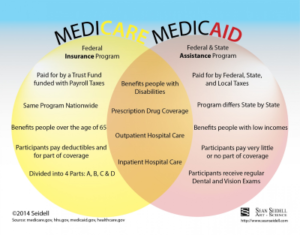 Medicaid is a combined program that work with both federal and state programs. Medicaid will help pay the costs for folks that have limited income and resources. They will have to meet other requirements, as well. When you have both Medicare and Medicaid you are referred to as “Dual Eligible”. Medicaid also offers benefits that are not normally covered by Medicare. For example, Medicaid will pay for nursing home care, if you qualify. Medicare does not pay for nursing home care.
Medicaid is a combined program that work with both federal and state programs. Medicaid will help pay the costs for folks that have limited income and resources. They will have to meet other requirements, as well. When you have both Medicare and Medicaid you are referred to as “Dual Eligible”. Medicaid also offers benefits that are not normally covered by Medicare. For example, Medicaid will pay for nursing home care, if you qualify. Medicare does not pay for nursing home care.
Medicaid will assist in paying for Medicare recipients with their Medicare Part A (hospital) and Part B (medical) with their out-of-pocket co pays/coinsurance, as well as pay for premiums expenses. In Florida, if you meet income and asset test under Florida Medicaid, the state will help pay your Part B premium ($121.80 in 2016) as well. Medicaid also offers benefits that are not normally covered by Medicare. For example, Medicaid will pay for nursing home care, if you qualify. Medicare does not pay for nursing home care.
If you qualify for Medicaid under Medicare, Medicare will be the primary payer and Medicaid will help pick up some, if not all of the cost sharing, which includes co-pays and coinsurance. These are expenses not paid by original Medicare or your Medicare Advantage plan. Medicaid may help pay for some or all of your expenses that Medicare does not cover.
When you qualify for Medicare and Medicaid, you will are eligible for a program called Low Income Subsidy(LIS). This also referred to as “Extra Help”. This is a joint program, through state and federal government to lower the cost of prescription medication.
Each state offers different Medicaid programs. When people with Medicaid move to a different state, they will have to re-apply for that state’s Medicaid. Each state has different criteria. The eligibility criteria is different from state to state. In some states you may be eligible for state assistance(Medicaid) with a higher income. If you move to a different state, your income may be too high to receive help. You need to contact your local Medicaid office for eligibility determination. In Florida, the Medicaid agency is called DCF(Department of Children and Family Services). They have local offices, as well.
If I receive Medicare and Medicaid, should I have a Medicare Advantage plan?
Just because you receive both Medicare and Medicaid, that does not mean you should not get a Medicare Advantage plan. First off, Medicare Advantage plans will provide you with extra benefits that you will not receive with original Medicare. You may be able to receive Dental, Vision, Hearing, Gym Membership (Silver Sneakers), Transportation and an integrated Part D drug plan.
Medicaid will assist beneficiaries with deductibles, co-pays and coinsurance associated with this type of coverage. CMS( Center for Medicare and Medicaid Services) will determine how much assistance you will receive with premiums and cost sharing amounts that Medicaid will help you with.
It’s important to understand that if you have Medicare and Medicaid and you enroll in a Medicare Advantage plan you must adhere to the rules of the plan, like whether you need referrals and adhering to the plan’s network of providers. A word of advice: If you choose to go this route, in terms of your coverage, make sure your providers accept this coverage and that all of your prescriptions are covered under the plan’s formulary (list of covered medications)
I will be able to assist you in determining the correct Medicare Advantage Plan that will work for you. I will make sure all of your doctors and prescription are covered. Everybody I work with is unique. I will find plan that work for you and your specific situation.
Dave Silver
Medicare Insurance Coverage Specialist
(813)417-2716
(941)907-2879
